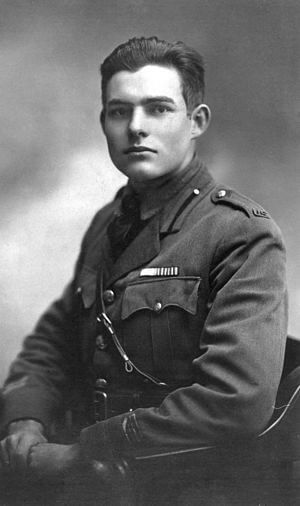Roland and Hemingway

I am only 10 chapters into Hemingway’s Farewell to Arms, and I am wondering why I am reading this book. Actually, I was asking myself this question after chapter 2. It may be due in part to my blasé attitude toward modern 20th century history and the World Wars, for which I have never displayed any interest. Reading the Song of Roland along side of Hemingway may also have something to do with my current disappointment. I almost hesitate to write, half expecting someone far more literate than myself to point out my amateurish remarks, but the comparisons between Roland and Lieutenant Henry unveil contrary perceptions of the soldier, war, and honor worth mentioning.
“Roland is fierce, Oliver is wise” the poet tells us, and gives us a glimpse into the virtue of these two men. Neither man desired to abandon their duty to the king; they only sought to exercise this duty in different ways.
Roland refused to take Oliver’s advice to blow the horn when they saw the hoards of Spanish paynems approaching their post while guarding the French troops who were returning home through the mountainous pass. Oliver pleaded with Roland to just blow the horn, and Charlemagne would hear the call, and return to help them defeat the coming storm. But Roland refused. Out of pride? Some of the characters fault Roland for his pride, but Roland turns a deaf ear to their accusations. Roland clearly states that he cannot call on the king when the king placed his trust in Roland to guard the pass. To call on the king for aid before a battle has even begun would bring shame upon the name of Roland and his house—his posterity. Roland refuses to cry for help because he gave an oath of fealty that requires him to fulfill his duty to the king. Falling short in this oath, to whatever degree, would strip him of honor.
I have not yet determined whether Roland suffers from the vice of pride, as others accuse him, or whether he is simply a man of honor who does not waver. For me, the later seems more likely. That aside, the pride or honor of Roland transcends any narrowing focus upon the man himself. Roland does not perform his duty for any self-benefit. He acts in service to something larger than his own desires. But even this does not wholly apply to Roland, for he has aligned his desires with those of France and of King Charles. Roland is not an individual; he is a man. What makes him bigger than life is that Roland lives not for any single life. Roland dedicates his life for that of others—for the king, and for his family and posterity.
I am not seeing the same virtue in Farewell to Arms. I do not see honor possessing a man to such a fierce degree that he will sacrifice everything to preserve it. I do not see the honor of country, king (president, dictator, leader), or one’s name guiding the decisions of a man in a time of war. It is true that Lieutenant Henry is not faced with the same circumstances as Roland, but he is present in a war, and therein exemplifies a much weaker nature with a more constrained sense of duty.
The fact that Lt. Henry is an American in the service of Italian forces causes me to question why. I believe a British soldier or nurse asked him the same question. The point is that a reader, such as myself, is immediately stripped of a traditional sense of duty. What’s going on? Why is he here in Italy? Why is he helping the Italians? What side are they on? What side is he on? Hemingway offers no sense of stability.
From the beginning, the story appears to be about men coping with the brutal realities of war by changing the subject. “Let’s talk about something else.” For the most part, the primary distraction from war has been the cycling batches of women with whom the men medicate.
At one point, Lt. Henry comes across a soldier with a hernia and attempts to take him to the hospital, but, the soldier informs, if he goes to that hospital they will fix him and send him back out to the front lines. He begs Lt. Henry to take him somewhere else. Shockingly, Lt. Henry tells the man how to fake a head injury on the road, and that when he drives back on his route he will pick the soldier up and take him to the other hospital.
In chapter 7 or 8 just before Lt. Henry is injured from shell shock, a few guys are sitting around bemoaning the war, while one individual keeps mumbling something along the lines of “why don’t we give up?’
I, by no means, wish to glorify war. I do not wish to suggest that soldiers should never mourn the tragedies of war. War is tragic, death should be mourned, and Hemingway seems to be doing an incredible job displaying these tragic realities. My attention is not drawn to war, but to the mindset and virtue of men confronted with the realities war projects upon them. I am wondering if these two tales present a stark contrast between Medieval nobility and Modern skepticism? Does Farewell to Arms show us Men Without Chests?
Buck Holler
Buck Holler is a former horse trainer and rodeo cowboy from Red Bluff, CA. Retiring from the rodeo circuit, Buck headed to New England to study theology and languages at Gordon-Conwell Theological Seminary in 2001. Since then he has worked as an educator and administrator in CA, New York City, and eastern NC. Buck first joined The CiRCE Institute as an apprentice in 2007, became a head mentor for the East Coast III apprenticeship in 2017, began the Latin Apprenticeship in 2019, and now serves in Concord, NC as CiRCE’s director of consulting.











